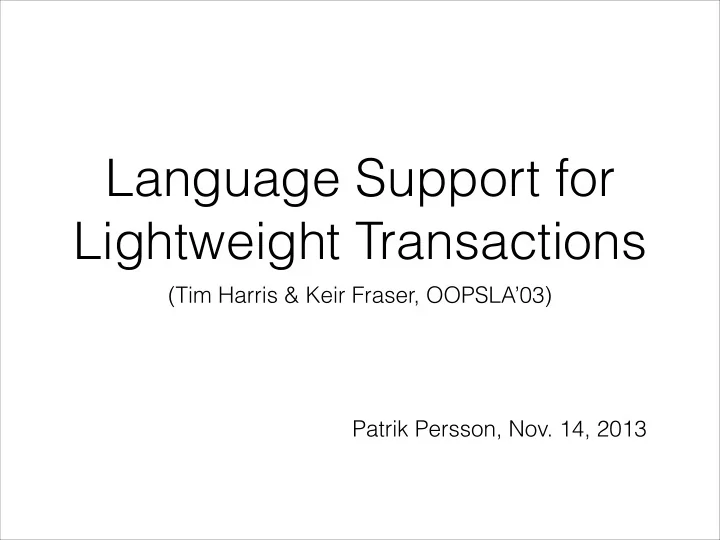

Language Support for Lightweight Transactions (Tim Harris & Keir Fraser, OOPSLA’03) � � � � Patrik Persson, Nov. 14, 2013
Java monitors are tricky! public synchronized int get() { int result; while (items == 0) wait(); items --; result = buffer[items]; notifyAll(); return result; }
Back to the drawing board • Conditional critical regions (Tony Hoare, 1972) public int get() { atomic (items != 0) { • Atomic execution wrt. items --; return buffer[items]; other atomic sections } accessing the same } data • Where did the lock go?
Software Transactional Memory (STM) • Transactional memory: a memory model that checks ordering of memory accesses • Optimistic access with recovery strategies, rather than conservative locking • Limited support in modern CPUs, e.g., Load-link & Store- conditional (MIPS, ARMv6, …) • Software transactional memory: software-based approaches with similar semantics • Still relies on some CPU support, e.g., Compare-and-Swap
Tracking versions in memory
Deadlock, be gone! atomic { atomic { synchronized(a) { synchronized(b) { synchronized(b) { synchronized(a) { � � ... ... � � } } � � } } � � } }
Summary • Declarative monitor-like concept, based on transactional memory • They call it non-blocking , but it’s really non-locking : blocking is possible (and intended) for boolean conditions • Claim to avoid deadlock & priority inversion • Fair performance, scales better than locking wrt. contention
Language Support for Lightweight Transactions Exercises
STM exercises (1/2) class Fifo { public Fifo(int sz) { vals = new int[this.sz = sz]; } Consider the class Fifo . public synchronized int get() Assume multiple producers, throws InterruptedException multiple consumers. { if (r == w) wait(); int result = vals[r]; r = (r + 1) % sz; 1. There is (at least one) notifyAll(); return result; concurrency-related bug } � here. How can it be public synchronized void put(int val) detected during testing? throws InterruptedException { if (r == ((w + 1) % sz)) wait(); vals[w] = val; 2. Rewrite the Fifo class w = (w + 1) % sz; notifyAll(); using atomic . How does } this solution address the private final int[] vals; bug above? private final int sz; private int r = 0; private int w = 0; // empty when r == w }
STM exercises (2/2) Now consider the class NumberSequence . The method someHeavyComputation() is class NumberSequence { … computationally intensive, and public synchronized void computeNext() { may have side effects. nbrs[pos++] = someHeavyComputation(); } … 3. This is thread-safe, but public synchronized int size() { return pos; inefficient. Why? } … private int pos; 4. If atomic is used, how might private int nbrs[]; } performance be affected? Explain the significance of transactions (STM) here.
Recommend
More recommend